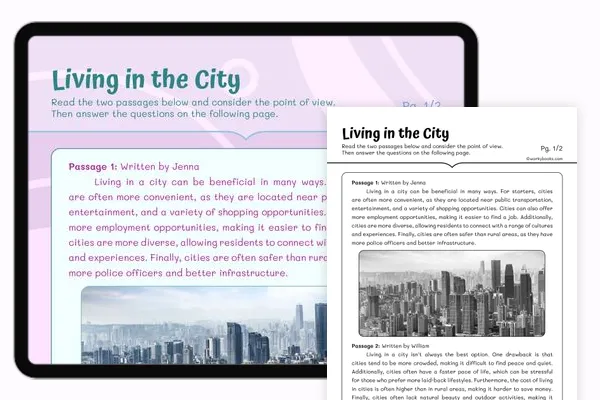The First Moon Landing — Passage
Firsthand Account: Buzz Aldrin's Recollection
As we approached the lunar surface, I could hardly believe what I was seeing. The Moon's landscape was like nothing I'd ever encountered – stark, gray, and pockmarked with craters. When Neil and I stepped onto the surface, the feeling was indescribable. The silence was absolute, broken only by our communications with Mission Control. Looking back at Earth from the Moon's surface was a profound experience that changed my perspective forever.
Secondhand Account: New York Times Article, July 21, 1969
On July 20, 1969, American astronauts Neil Armstrong and Edwin "Buzz" Aldrin became the first humans to land on the Moon. Their spacecraft, Eagle, touched down on the lunar surface at 4:17 p.m. EDT. Armstrong's first step onto the Moon's surface was broadcast live to millions of viewers around the world. The astronauts spent about two and a half hours outside the spacecraft, collecting samples and taking photographs. This historic achievement marked a major milestone in space exploration and human history.
What is a key difference in the information provided by the two accounts?
The firsthand account describes personal sensations, while the secondhand account focuses on factual details and the event's significance.The firsthand account provides the exact time of the landing, while the secondhand account describes the Moon's appearance.The firsthand account mentions the live broadcast, while the secondhand account describes the astronauts' tasks on the Moon.The firsthand account discusses the spacecraft's name, while the secondhand account focuses on the astronauts' emotions.Which detail is only mentioned in the secondhand account?
The silence on the MoonThe collection of lunar samplesThe view of Earth from the MoonThe color of the lunar surfaceHow does the focus of the firsthand account differ from the secondhand account?
It emphasizes the technical aspects of the missionIt concentrates on the public's reaction to the eventIt highlights the personal, emotional experience of being on the MoonIt provides a detailed timeline of the entire missionWhat additional context does the secondhand account provide?
The personal backgrounds of the astronautsThe global impact and historical significance of the eventThe scientific discoveries made during the missionThe challenges faced during the spacecraft's return to Earth











